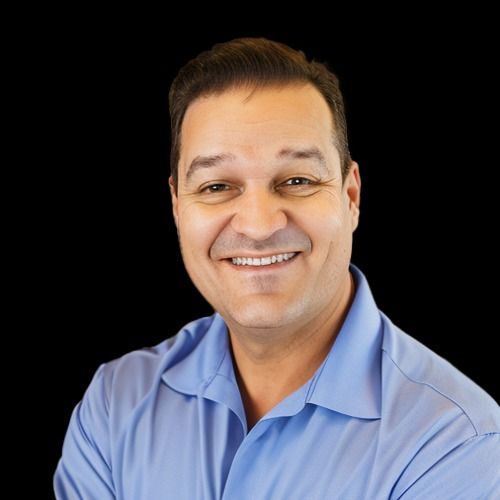Episode 130
My Thoughts On The Millionaire Next Door
Today, we delve into the transformative insights of "The Millionaire Next Door" by Thomas Stanley and William Danko, a book that has profoundly impacted my perspective on achieving financial freedom. As someone who works closely with individuals amassing significant wealth, I initially picked up this book to better understand their mindset. What I discovered were ten key concepts that define these hidden millionaires. We'll explore how these unassuming millionaires prioritize time, energy, and generosity, shaping not only their financial success but also their role as mentors. Tune in to uncover the lesser-known traits of wealth builders and gain insights that can empower your own journey towards financial prosperity.
About Jeff:
Jeff spent the early part of his career working for others. Jeff had started 5 businesses that failed before he had his first success. Since that time he has learned the principles of a successful business and has been able to build and grow multiple seven-figure businesses. Jeff lives in the Austin area and is actively working in his community and supporting the growth of small businesses. He is a board member of the Incubator.Edu program at Vista Ridge High School and is on the board of directors of the Leander Educational Excellence Foundation
Connect with the Freedom Nation podcast at https://freedom-nation-podcast.captivate.fm/
Connect with Jeff:
Instagram: https://www.instagram.com/freedomnationpodcast/
Twitter: https://twitter.com/JeffKikel
LinkedIn: https://www.linkedin.com/in/jeffkikel/
Thanks for listening!
Thanks so much for listening to our podcast! If you enjoyed this episode and think that others could benefit from listening, please share it using the social media buttons on this page.
Do you have some feedback or questions about this episode? Leave a comment in the section below!
Subscribe to the podcast
If you would like to get automatic updates of new podcast episodes, you can subscribe to the podcast on Apple Podcasts or Stitcher. You can also subscribe in your favorite podcast app.
Leave us an Apple Podcasts review
Ratings and reviews from our listeners are extremely valuable to us and greatly appreciated. They help our podcast rank higher on Apple Podcasts, which exposes our show to more awesome listeners like you. If you have a minute, please leave an honest review on Apple Podcasts.
Transcript
Welcome to the Freedom Nation podcast with Jeff Kikel. On this show, Jeff shares his expertise in financial and retirement planning from a different perspective. Planning for Your Freedom Day, which is the first day that you wake up and have enough income or assets and do not have to go to work that day. Learn how to calculate what you need, how to generate income sources, and listen to interviews from others who've done it themselves, get ready to experience your own Freedom Day.
Jeff Kikel:Hello, Freedom Nation. It's Jeff here once again. And this is another of our book reviews of different books that in my life have been key to me getting my financial freedom. So today's book is number six on our list, and it is The Millionaire Next Door by Thomas Stanley, and William Danko. This was a book that for me, I started to read it not because I really wanted to be The Millionaire Next Door. But I was working in the financial services industry. And specifically, I was working with people that had a million dollars plus with the firm that I was working with. And we're in kind of the center part of the country. They tended not to be real, super ostentatious. They didn't act like they were rich. But this book helped me to understand them a little bit better. And in addition to that, it helped me to develop that the persona that I wanted to as I became wealthy, as I built assets, I really started to want to learn how these people successfully went through life, and how it you know what it took for them to become wealthy and, and really model my own behavior after what they were doing. There's just a, you know, 10 concepts that this book has. And you know, I'll share those with you today. But I will tell you this, probably one of the most eye opening books that I've ever had, because most of the people that were interviewed in the book, you would never know that they're rich. I always say, you know, if you look at Warren Buffett, great example, he lives in basically the same house he's lived in for almost 60 years, it's maybe worth a half million, maybe a little bit more today than Omaha, Nebraska, he still drives an Oldsmobile to work or a Buick or something like that. So if you didn't know that he was one of the richest guys in the world, you would never know it by looking at him. So when we start to look at the key concepts in this book, The first of which is frugality. Now, this doesn't mean cheap. It means that people that are The Millionaire Next Door, are frugal with their money, they manage their money very wisely, they live well below their means. And they just don't look to have an extravagant lifestyle. Many times, they don't want to drive the fanciest car on the block, because everybody would be talking about him, especially in the middle part of the country. So this is something you know, in my own life, I didn't do this at the beginning, really, I didn't do this until about 10 years into the financial business, I felt like I had to show off and I had to show that I was wealthier, you know, or that I was wealthy and successful. And you know, in the end, the old joke when it comes to brokers or financial advisors is, you know, your brokers typically broker than you are. So, frugality is an absolute key. And it's something that I had to learn to do. And I have to control that, you know, interest or interest in spending money on something that's a cool tool, or a cool toy, not necessarily the show off, but it's a cool toy, something I have to keep control of all the time. The other or the next key concept is focused on financial independence. And this is something that wealthy individuals prioritize above all else, is that financial independence, making sure that they reach a point in time where they don't have to work anymore if they work for a job, or reach a point where their business can be sold, or they can you know, exit from their business and they will be financially independent as a result of that. And it's much more important or important than displaying high social status. They want financial independence, self made wealth most millionaires in this country and around the world. Were self made, they didn't inherit it. They didn't they're not you know, a royal that had this money given to them, or you know, expected of them. They're self made people they either chose a profession that they made good money, they saved money like crazy and you know, or they started a business and became wealthy through that. Number four in the list is person per Efficient and targeting market opportunities. And that's really key is they've targeted the right areas to be in, they didn't decide to go into buggy whips, because there are no more buggy whip manufacturers, they looked at, alright, I want to be successful, I'm going to look at industries that potentially could be there. These are the people in our world now that are that are wealthy, that got into PCs in the early years, that got into the semiconductor industry, all these people that saw the future, and they were able to target it. And specific market niches with it, choosing the right occupation, as well kind of falls into that same thing. But a lot of wealthy individuals chose a profession that, you know, one they went to school for, that was a profession that they could make good money, they didn't go out and get a degree in underwater basket weaving, and then try and bounce around between a bunch of different jobs where they weren't really successful. They targeted a profession where they knew they were going to make good money, and were able to direct that towards savings. They're also economically self sufficient. This is one of the things they're really not dependent on any kind of inheritance, a lot of them, especially the baby boom generation, their parents lived a lot longer than then, you know, previous generations had, in some cases, they're inheriting some money, but they're not really counting on it, because their parents are living longer and burning up a lot more of their assets. So they're relying on themselves, they're relying on their ability to save and build wealth. Over time. They invest wisely. So they look at the best places to invest. They do not believe in expenses rising exponentially with the amount of money that they're investing. They're very, once again, frugal by nature, but they invest wisely with their money, they put it in places that they feel are good for the long run. They also avoid lifestyle creep and other thing kind of falls with the frugality thing. They don't keep adjusting their lifestyle up as they make more money, they will just kind of keep the same lifestyle as it is this is one that I really, it took me a while to learn, and we were not doing this in our lives and you know, had to really kind of adjust our thinking. And, you know, I realized now that, you know, effectively what we spend today, my wife and I spend is about what we've spent for about the past six to seven years that our minimum required income is roughly where it's been for about the six last six or seven years. Although I've made a lot more money in that time period, what it's done is given me the ability, then to redirect that into other assets, typically assets that are going to create an income stream, which then just kind of keeps building on and building on and building on itself. Financial literacy, they value financial literacy, they also value working with people that can help them with financial literacy. So they value working with advisors like myself, they value people that will teach them and help them learn about financial literacy. They also are always out there looking at it from the point of view of reading about it, following certain blogs, reading, certain magazines, all those type of things, they continue to do that. And they continue to be knowledgeable about this, because they want to keep growing their wealth. And they realize as they grow their wealth, they need to understand it much, much more. Last but not least, the last one is prioritizing time and energy. They focus on activities that give them the greatest financial return. So they don't do or they don't, they tend not to focus on things that don't generate a return on investment, or that are just busy work. They tend to focus on things that if I put my effort into it, or my money into it, I'm going to get a return in some way, shape or form out of that might be knowledge. It might be actual wealth and money. It just doesn't matter. But it's really that prioritization of their time, and not deciding to okay, I'm just going to play video games for you know, half a day or something like that. They're always prioritizing time and energy. I will tell you, you probably see more of these people than you would expect to know in your life, they will not show it. I will tell you from working with clients in this category for most of my life, now longer than I haven't worked with them. They are some of the most amazing people in the world. They're some of the most generous people in the world as well. Because they have the generosity they have the time and they have the assets to be able to share that with others and they're also very good mentors as well. So I love this book. It's one that I have on the list. It was one that I, as I was looking through my book list and thinking about what had helped me over my life that I came across again, and I said, You know what, I've got to read this again, because it's literally been 15 years since I read it the last time. But it still has a profound effect on me understanding and knowing the people that I work with, but also modeling those people in myself as well as I go on throughout my life. So I hope you enjoyed this. This is one of those books that I hope that you actually find and go through and really internalize the concepts in there. Make sure you subscribe to the channel and hit that little notification button because we want to make sure that you are getting these as they come off. Over the next several weeks. I'll be sharing these with everybody. Make sure that you are subscribed so that you get those every time and I will see you guys back here the very next time.


